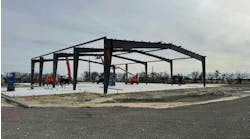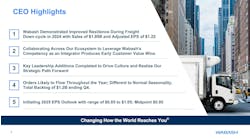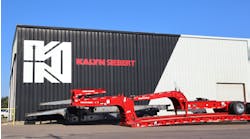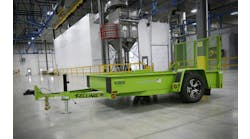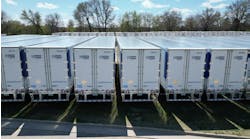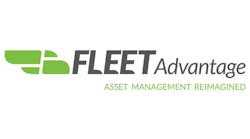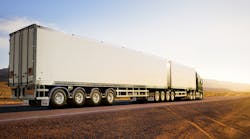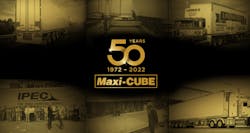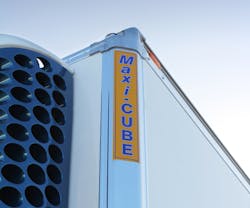The year 2022 marks another significant milestone for Australian road transport with refrigerated and dry freight solutions brand, Maxi-CUBE, celebrating 50 years since the brand came into existence.
Officially, the business of Maxi-CUBE started in 1972, however its beginnings extend well before this time. According to one of the brands recently retired founding fathers, Jim Curtis, there’s an interesting story behind the brand we have come to know today.
In 1960 Australia was a bustling place with a growing post-war economy with plenty of golden opportunities for those that sought after them. After migrating from the UK with his wife, a young Jim soon landed a job with General Motors Holden where he put his creative energy to work as a Junior Layout Draftsman when the classic FB Holden’s were rolling off the assembly line.
Jim made contacts with automotive product suppliers in the growing plastic fabrication industry and in 1961 joined road transport equipment manufacturer, Freighter.
Refrigerated freight was emerging in the road logistics industry and Freighter joined with US company, Trailmobile, to bring to Australia aluminium van manufacture expertise in competition with Australia’s then leading trailer builder, Fruehauf.
Jim was, even then, looking to the future and saw the potential of plastic composite construction of insulated vans in a market where these needs were being met by insulated aluminium panels.
In the late 1960s Jim moved to Reinforced Plastics and was integral in the development of fibreglass insulated vans. In the early ‘70s, Reinforced Plastics partnered with the much larger Australian Consolidated Industries and received a make-or-break contract to supply 2,000 containers.
When it seemed the venture was about to fly, the then Prime Minister Gough Whitlam revalued the Aussie dollar and caused a collapse in the manufacturing sector that relied on trans-Pacific economic dependencies.
The Reinforced Plastics contract was more break than make, but the business kept on.
During the 70’s, truck and trailer manufacturers were scenting growth across the industry and plastic industrial giants were competing to find the right solution for the use of plastic composites in insulated and refrigerated vans.
Jim’s interest in road transport solutions still called and he joined Deltacraft, a company manufacturing fibreglass boats, although it was the broader vision that drew him to the company. As Deltacraft grew, one area of focus was developing containers for Woolworths, this would be a vital component in the formation of Maxi-CUBE. Deltacraft soon hit tough times and a new company called General Plastics was established in 1972 and took over the road transport contracts of Deltacraft—the beginnings of Maxi-CUBE.
As fate would have it, things then took a turn for the better with Government regulations allowing wider trailers. General Plastics designed and engineered an insulated trailer that made use of the extra width plus a low tare double loader design that got transport operator Frank Selwood a lucrative and far reaching contract. And the road transport industry was watching on.
The mix of ingredients was just right during this time, when an accountant Peter Ralph joined with sales and marketing guru, Ron Redman, along with engineering manager, Luke Hogeboom.
Together, under the drive of forward-thinking Jim Curtis, rebranded General Plastics to Maxi-CUBE. The expertise developed meant Maxi-CUBE was delivering semi-trailers with a one tonne tare advantage over the opposition with lower cost manufacture.
With a purpose-built facility in the southwest of Melbourne, Victoria, all of the accumulated manufacturing expertise was put into play. Through the buoyant 80s, trailers were rolling off the assembly line, designs improved and products filled the need of the market.
Maxi-CUBE was listed on the stock exchange in 1994 and evolved into the large corporation of MaxiTRANS after acquiring Freighter during the same period.
MaxiTRANS purchased other trailer manufacturers, merged with others and now delivers the full spectrum of heavy-duty trailers across all sectors of road transport. Last September, the MaxiTRANS trailer business was purchased by Australian Trailer Solutions Group (ATSG), which is a private group comprising of local investors who are committed to Australian manufacturing and delivering high quality products for customers.
Today, Maxi-CUBE is celebrating 50 years of designing and manufacturing road transport solutions for Australian customers. With all Maxi-CUBE trailers continuing to be manufactured locally in Victoria across MaxiTRANS manufacturing facilities located in Hallam and Ballarat.
“Maxi-CUBE’s proud and long history is testament to the support of our loyal customers, said Kevin Manfield, MaxiTRANS general manager, sales and marketing. “Our customers play a vital role in the Australian economy and we are proud to partner with them through supplying innovative transport solutions that aid in delivering the needs of our nation.
“Some of our customers have been with the brand since its humble beginnings. It is this commitment that has helped shape Maxi-CUBE into the brand it is today, building a reputation of outstanding quality, performance and reliability.”
Maxi-CUBE is the third trailer brand under the MaxiTRANS banner to reach a milestone in as many years, with Hamelex White reaching 25 years in 2020, and Freighter celebrating 75 years in 2021.
“To have multiple brands reach significant milestones over the past few years is a great achievement not only for our people, but for the wider transport industry,” said Manfield. “Supporting Australian business and locally manufactured products is what has made it possible for brands like ours to continue to thrive.
“We take this opportunity to thank all our customers, suppliers and staff for their on-going support throughout our extensive history. We look forward with great excitement to the future of Maxi-CUBE and the transport industry collectively.”

